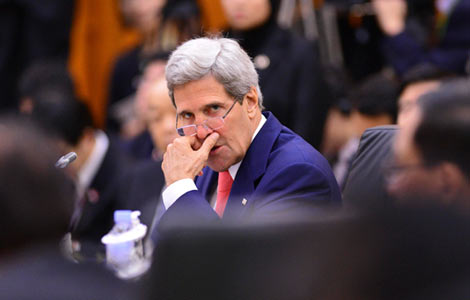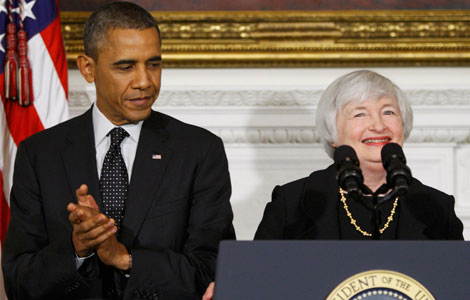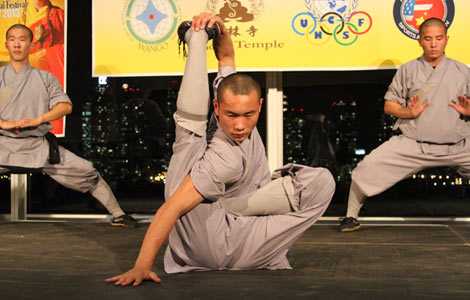Waiting for home bands to play the right tune
Updated: 2013-10-11 07:23
By Xiao Lixin (China Daily)
|
||||||||
The hottest topic of discussion among students, according to Sina micro blog, is neither education nor future careers; it is Hallyu stars of the Republic of Korea. A quick glance at the micro blog, reveals how much Chinese teenagers adore ROK music groups.
Chinese teenagers' love for Hallyu stars may seem superficial to many. But there is a lesson here for the Chinese music industry. Hallyu, or the Korean wave, a term coined by Chinese journalists in the late 1990s, has been used by Asian people to describe the popularity of ROK pop music, TV dramas and films.
K-pop, the pioneering Korean wave, is extremely popular in East and Southeast Asian countries - it is catching on in other parts of the world as well. The mind-boggling popularity of "Gangnam style", a song by K-pop singer PSY - whose video had generated over 1 billion clicks on YouTube by the end of 2012 - is hard to explain. So what does K-pop owe its success to? The answer: reform and government support, and the ROK entertainment industry's well-organized "star-producing" system (though some have criticized it for its "slave contracts").
K-pop, however, still faces challenges. Perhaps free music download has hurt it the most. According to the ROK government's 2011 white paper on the music industry, the returns peaked at 410.4 billion won ($37.5 million) in 2000 but dropped to 82.3 billion won in 2010. It has dropped further over the last two years, between 70 billion and 80 billion won.
The ROK realized early that the Korean wave was a once-in-a-lifetime opportunity to enhance the country's image and promote its soft power. Accordingly, it introduced a series of supportive policies at the beginning of this century to help its cultural industry. And the ROK Ministry of Culture, Sports and Tourism decided to invest 127.5 billion won as part of its medium-term plan (2009-13) to revive the domestic music industry and internationalize K-pop.
Entertainment companies in the ROK hold open auditions and use their scout network to recruit teenagers from all around the world. For example, Han Geng, a former member of Super Junior, joined the K-pop group through an open audition held in China, and Nichkhun, a Thai American, was recruited in Los Angeles. Apart from learning how to sing and dance as professionals, the trainees also receive coaching in acting and foreign languages, such as Japanese, Chinese and English, to meet the demand of the global market.
Normally, it takes three to five years for a teenager to hit the stage, but only one in every 10 trainees succeeds in becoming part of a group made up of other chosen trainees. Even established groups have a "shelf life" of about five years on average because newer, younger groups emerge to replace them or group members choose to go their different ways. The sharp competition forces K-pop bands to remain at their professional best or risk demise.
In comparison, many Chinese singers emerge from talent shows and attain stardom even before undergoing systematic, let alone comprehensive, training to meet the demands of the audience and the market. At best, their training lasts for a season. Worse, the short-term profit-driven entertainment agencies, with which the budding stars sign contracts, spend little or nothing on their professional training.
Chinese entertainment companies that want to widen their market have to find ways to extend the longevity of their singers, for which they could learn a thing or two from their neighbors to the east and use their experience to generate a Chinese musical "phenomenon".
The author is a writer with China Daily.
E-mail: xiaolixin@chinadaily.com.cn.
(China Daily 10/11/2013 page9)

 World's 1st curved smartphone hits S Korean stores
World's 1st curved smartphone hits S Korean stores
 Fiscal deadlock will be resolved, Kerry tells Li
Fiscal deadlock will be resolved, Kerry tells Li
 Life struggles on after devastating flood
Life struggles on after devastating flood
 Obama nominates Yellen for top spot at Fed
Obama nominates Yellen for top spot at Fed
 ZTE shoots for global markets
ZTE shoots for global markets
 3 US scientists win Nobel chemistry prize
3 US scientists win Nobel chemistry prize
 Reliving bicycle kingdom
Reliving bicycle kingdom
 Shaolin kung fu dazzles the UN
Shaolin kung fu dazzles the UN
Most Viewed
Editor's Picks

|

|

|

|

|

|
Today's Top News
China calls for social reconciliation in Egypt
Obama 'likely' to sign debt extention bill
Kerry says US will work to end fiscal crisis
Asian 'safety net' stressed
90% US firms make profits in China
Currency swap signed a 'landmark'
Libyan PM released
Trending news across China
US Weekly

|

|







